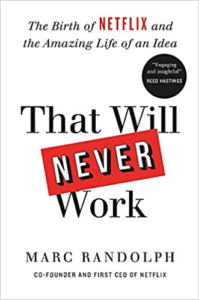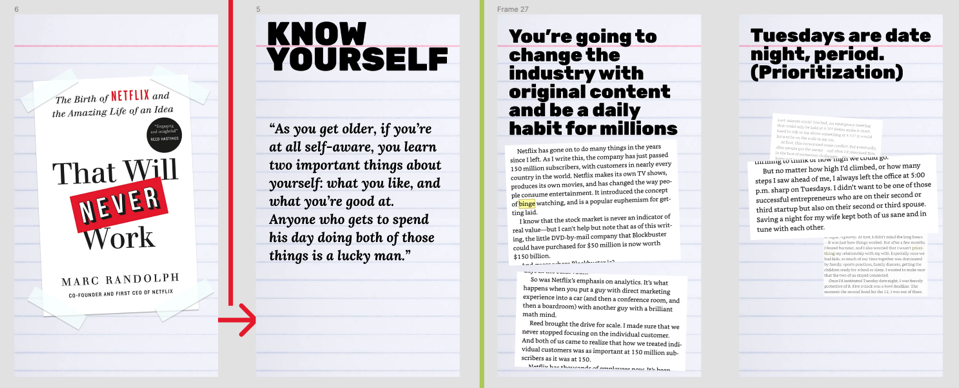
Check out the full notes for “That Will Never Work: The Birth of Netflix and the Amazing Life of an Idea” by Marc Randolph
Marc Randolph was one of the founders of Netflix. In That Will Never Work, he writes about the early days of Netflix, before they started their original content empire. (He left in 2002.) Near the end, he mentions some of the things that happened after he left:
As I write this, the company has just passed 150 million subscribers, with customers in nearly every country in the world. Netflix makes its own TV shows, produces its own movies, and has changed the way people consume entertainment.
(Shout out to the “Skip intro” button that I’ve pressed countless times before rewatching Arrested Development episodes.)
They started small (How do you get to 150 million subscribers? One at a time)
Here’s the first day:
We’d expected 15 or 20 people to use the site to order a DVD. We’d gotten 137—and potentially we’d gotten more than that, since we didn’t know how many people had tried to access the site when it was down.
The printers also jammed all day. And that’s just one many reminders of the state of the world back when Netflix started. DVDs weren’t the clear standard yet to take over VHS. You couldn’t start an online business in a weekend by connecting a few cloud services together.
He praises Reed Hastings throughout the book and knew he was the right CEO to get them to where they are today. That was pretty refreshing after reading Hatching Twitter earlier this year and seeing all the scheming, navigating, and backstabbing going on in their leadership. (Good drama for a book, though!)
Remember when you weren’t online, everywhere, at all times?
The most enjoyable parts are descriptions of the world before everyone was online, everywhere, at all times. It was great to learn how data and recommendations were core to their business, even in the earliest days.
As we talked, I learned that Mitch ran a small chain of video stores called Video Droid. He had ten locations and managed thousands of titles in each one of them. I was interested in the way he talked about the practical challenges of maintaining an inventory of both new and classic films, but what really fascinated me was his deep knowledge of movies and his even deeper connection with his renters. He paid attention to what they liked, what they asked for, and what they wanted. He was a movie buff, and he wanted to help his customers find the kinds of movies they’d love. That meant giving them not only what they thought they wanted but what they didn’t even know they wanted. Mitch was a walking, talking IMDb. He watched movies all day at the store, then went home and watched a movie while he was eating dinner, then stayed up late watching even more movies.
“Mitch” here is Mitch Lowe, who was also a part of Netflix and was later part of leadership at Redbox and MoviePass. Some people love movies. Some people really love movies.
Go home at 5 p.m. sharp (Well, at least once a week)
Another quote I highlighted while reading was about knowing yourself:
“As you get older, if you’re at all self-aware, you learn two important things about yourself: what you like, and what you’re good at. Anyone who gets to spend his day doing both of those things is a lucky man.”
If you do something you like that you’re not good at, there’s good reason to keep that as a hobby. If you’re do something you’re good at that you don’t like, you’re probably being paid for it right now. Once you’re aware of where you are on most days, you can build awareness around what aspects of the day you do like and make it a goal to add more things that you enjoy to your day.
And the last clipping is this quote about prioritizing time.
He always kept his date nights.
Why become a millionaire many times over if you can’t go home to your family when you want to?

